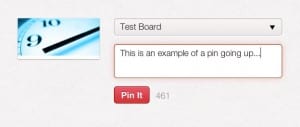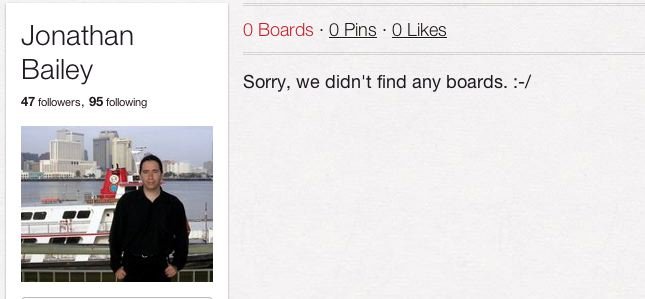The Great Pinterest Divide: To Opt Out or Not
 There’s no doubt that Pinterest is one of the hottest names in social media right now. The social networking startup, which allows users to “pin” images found from all over the Web, has become wildly popular not only for its ability to attract over 11 million users, but also it’s popularity among women.
There’s no doubt that Pinterest is one of the hottest names in social media right now. The social networking startup, which allows users to “pin” images found from all over the Web, has become wildly popular not only for its ability to attract over 11 million users, but also it’s popularity among women.
But amidst the explosive growth and name recognition has rested a series of dark questions. Not only has Pinterest taken fire of its undisclosed use of Skimlinks to generate revenue, but many photographers have been heated in their criticism of how Pinterest handles copyright.
This has led to something of a divide among photographers and other visual artists, with many embracing Pinterest openly and using it as a marketing tool and others referring to it as the “New Napster”.
So which photographers are right? It’s impossible to say, largely because very content creator is different. However, it’s worth taking a closer look at Pinterest, the legal issues around it and what the arguments for and against it are.
The Problem With Pinterest
 Pinterest is a social network that centers around “pinning” visual images. The idea is simple, if a user finds something they like on the Web and want to remember they “pin” the image to their board. If that board is shared, all of the people following that person will see the image as well.
Pinterest is a social network that centers around “pinning” visual images. The idea is simple, if a user finds something they like on the Web and want to remember they “pin” the image to their board. If that board is shared, all of the people following that person will see the image as well.
A good example of this would be to create a board of nature photography or interesting logos. The user would then scour the Web to find content relevant to the board and pin the images there, creating both a collage for themselves and sharing the pins with their followers. Those followers can then “repin” that image to their own boards, further spreading the image.
However, it’s that process of pinning itself that is creating much of the controversy. Most of the pinning being done is without the explicit permission of the copyright holder and, according to several photographers, it involves the copying of the full-size image to Pinterst’s server.
To some photographers and artists, this is a matter of Pinterest actively encouraging its users to commit copyright infringement. Pinterest’s terms of service explicitly say that content posted to Pinterest should be either owned by the user or otherwise non-infringing. However, this runs counter to Pinterst’s own promotion of their bookmarklet, which says that you can use it to “Grab an image from any website and add it to one of your pinboards.”
Attribution has also been a thorny issue for Pinterest. Though Pinterest does affix attribution with each pin, listing the site it was pinned from, users don’t always pin from the original source. Google, for example, is the second most popular source for new pins. Also, other information, such as name, year of creation, etc. are also stripped out and the problem often becomes worse as an item is further spread on the service.
However, Pinterest hasn’t ignored the uproar either. In addition to the site’s DMCA policy, which is prominently linked to on every page, Pinterest also announced that it was limiting the length of captions to 500 characters and, more importantly, giving webmasters a way to opt-out of being pinned.
But is it enough to put the issues to rest and what should artists do? The answers are far less clear?
To Opt-Out, or To Opt-In
 Pinterest’s opt-out system works by having the user add a line of code to the header of their site, basically a hidden line of code that tells Pinterest not to let users pin anything on that page. If a user does attempt to do so, they will be greeted with a message that the webmaster has turned off pinning and to direct any questions to them.
Pinterest’s opt-out system works by having the user add a line of code to the header of their site, basically a hidden line of code that tells Pinterest not to let users pin anything on that page. If a user does attempt to do so, they will be greeted with a message that the webmaster has turned off pinning and to direct any questions to them.
However, several problems with the opt out system are instantly obvious.
- Not All Artists Can Opt-Out: If you don’t have control over your site’s template, such as being a Flickr user, you can’t add the code and, thus, you can’t opt-out. Unlike Google, which provides other means of removing your site, Pinterest only provides the code.
- It Doesn’t Stop All Pins: With Google, mostly Google Image Search, already the second most popular source for pins, Pinterest’s opt-out system won’t stop a large amount of the unwanted pinning that takes place.
- The Future: Finally, if we have to add a line of code to block Pinterst, what happens when the inevitable wave of Pinterest clones come around? Will artists have to add a separate line for each of them?
In short, the opt-out is hardly guarantee that your content won’t wind up on Pinterest and it certainly seems to be a weak strategy moving forward.
However, that doesn’t necessarily mean that it’s a bad idea. Though many artists have gained a great deal of benefit from embracing and even encouraging Pinterest use, others might have reason to want to block it and the opt-out, though imperfect, is at least a first step.
A lot of it comes down to business model and how artists hope to earn revenue. Those who aren’t marketing to consumers will likely find Pinterest to be very useful but those who are may want to both take better care to watermark public images and, potentially, opt-out of Pinterest altogether.
Most artists, at least digitally, seem to be in the former category.
In the meantime though, the opt-out system has not fully answered the copyright concerns many have about Pinterest and, in some cases, may have even fanned the flames.
Is Pinterest in Legal Hot Water?
 The big question everyone wants to know is “Is Pinterest legal?” The short answer is that no one knows. There’s never truly been a service like Pinterest and the relevant court cases don’t provide a great deal of direct guidance.
The big question everyone wants to know is “Is Pinterest legal?” The short answer is that no one knows. There’s never truly been a service like Pinterest and the relevant court cases don’t provide a great deal of direct guidance.
According to one analysis, Pinterest is distinctly different from seemingly relevant cases involving Perfect 10 and Google, which found that the displaying of thumbnails for search purposes is legal, and that those cases don’t directly apply. Not only is Pinterest using full size images, but it is hosting those full-sized images on their services, two things Google does not do.
Another analysis looks at Pinterest in light of the Grokster ruling, in which the Supreme Court found the file sharing service Grokster liable for copyright infringement due to the fact it actively encouraged, or induced, the infringement. This analysis argues that, since Pinterest is actively encouraging pinning of images found on “any” website and their business model relies on widespread infringement, it could be liable under that test.
Pinterest, on the other hand, argues that it qualifies for DMCA safe harbor and that it is protected under that law since it’s the users, not the site itself, committing any infringements. However, as the Grokster case showed, not being the one directly responsible for the infringement is not always a safe place to be legally.
In the end, until a judge takes this case up, there isn’t going to be any real clarity. However, what is clear is that Pinterest is in some very murky and very uncertain waters and the opt-out system isn’t likely to help because it isn’t an “standard” technical measure as with robots.txt and meta tags for Google.
In short, throwing up an opt-out system is more likely about appeasing angry artists than it is protection from the law and only time will tell how effective it is on that front.
What Should Artists Do?
So what should an artist do? There are no easy answers. Many artists are reporting great success with Pinterest and others are worried about large-scale infringements.
If you’re a retailer selling physical goods, a service like Pinterest can be a great boon for you, helping you get the word out about your products. Since your digital images really aren’t your product, there’s little risk but certainly a great deal of reward.
If you’re a digital artist that primarily works with, sells or makes digital works, the questions become more uncertain.
Since Pinterest isn’t perfect with attribution, it makes sense to include reasonable watermarking on your images, just enough to ensure that attribution is always carried with it, and to keep an eye on your inbound links to see if your work may be active on the site. However, this has been good advice for almost as long as there has been images on the Web.
The decision to opt out or not is going to be a largely personal one. However, given how incomplete the opt out is, I don’t see it as doing much good. Removing your site from Pinterest won’t stop Pinterest from using your images, just the ones that would be attributed back to you.
In short, unless you have a very strong reason to want to block Pinterest, you’ll probably not want to bother with the opt-out, at least at this time.
Hopefully, as Pinterest learns more about these issues, they can build more robust and effective systems for dealing with these issues and giving content creators a reasonable amount of control over how their work is used in the system.
But even when/if that happens, there still won’t be any easy answers for artists, just more choices on how to handle this new social networking tool.
Bottom Line
Pinterest is not the first new company to raise difficult new copyright questions and it won’t be the last. It’s part of the evolution of the Internet and every new service from Geocities to YouTube has gone through a similar period of legal uncertainty and confusion as to where it fits in for artists.
A lot of times, as with YouTube, the service has to make some serious changes, to balance copyright issues and their goals. Likely, Pinterest is going to have to do the same.
The challenge though is whether Pinterest, whose appeal and business model depends largely on people being able to pin almost anything, will be able to move forward as it stives to find this balance. YouTube, for example, can survive perfectly fine without any infringing material but it seems unlikely Pinterest could do the same if its users needed permission for every pin.
In the end, Pinterest’s fate could be decided in a court of law, not the court of public opinion, and that would frustrate people on both sides of the issue, most of whom who would rather find a way to use the power of Pinterest while mitigating the copyright risks.
Want to Reuse or Republish this Content?
If you want to feature this article in your site, classroom or elsewhere, just let us know! We usually grant permission within 24 hours.
